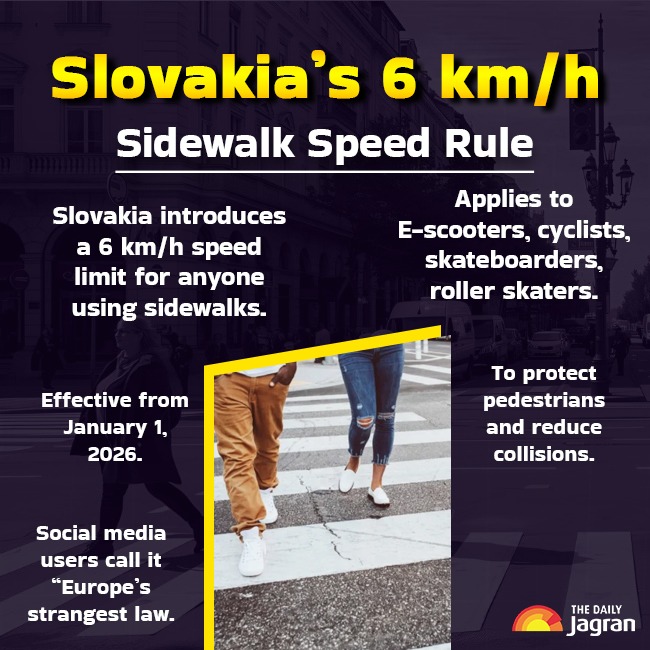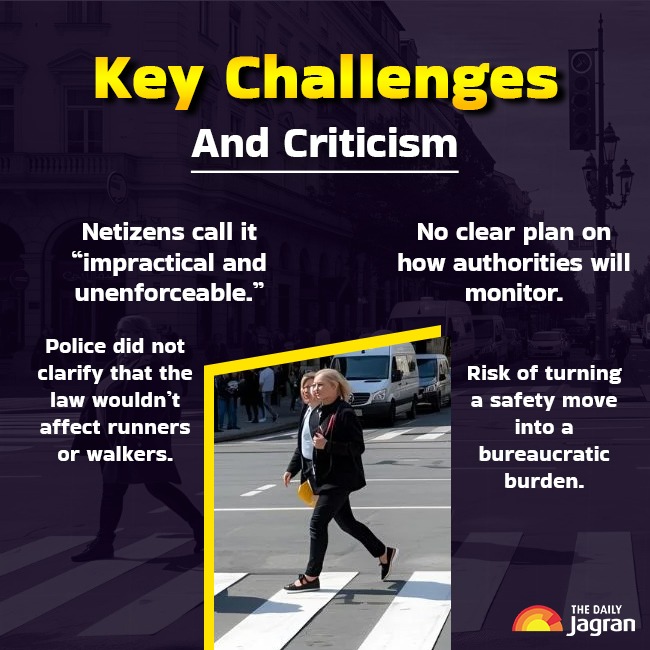- By Supratik Das
- Fri, 31 Oct 2025 06:45 PM (IST)
- Source:JND
Interesting facts from around the world: In a surprising move, Slovakia has passed a new law imposing a 6 km/h speed limit on sidewalks, which will be applicable to bikers, e-scooter riders, and skateboarders from January 1, 2026. The controversial law, targeting the rising number of road accidents caused by electric scooters, has unleashed a heated debate over its practicality, whether it can be implemented in real life, or how.
The regulation will make sidewalks safer by regulating the speeds of fast-moving e-scooters and other vehicles that often pose risks to pedestrians in busy urban centers, said lawmakers. The amendment was proposed by Ľubomír Vážny from the ruling Smer party led by Prime Minister Robert Fico and passed earlier this month in parliament.
“The main goal is to increase safety on sidewalks in light of the growing number of collisions with scooter riders,” Vážny explained, noting the rule will help authorities objectively determine whether someone was moving faster than what’s considered safe in pedestrian zones.
Recommended For You
The law, despite its stated intentions, has been sharply criticised by opposition parties and the public alike. Many have labeled the measure as "absurd" and "impossible to enforce," since it unfairly targets cyclists and scooter users rather than addressing the real issues of poor infrastructure and road safety.
Martin Pekár, an opposition lawmaker for the Progressive Slovakia party, said the law punishes sustainable forms of transportation. “If we want fewer collisions, we need better and safer bike lanes — not rules that are physically impossible to follow. At 6 km/h, most cyclists can barely keep their balance,” Pekár told Politico.
The Interior Ministry has also distanced itself from the regulation, suggesting that banning e-scooters on sidewalks entirely would have been a more effective solution.

Criticism And Confusion over 'Walking Speed Limit'
After the announcement, Slovaks flooded social media with humor and disbelief. Many wondered whether they would be fined for “power walking” or running to catch a bus. Memes mocking the new rule quickly went viral, with users joking that citizens might soon need speedometers on their shoes.
But the police have since explained the misunderstanding. According to police vice-president Rastislav Polakovič, who spoke with Euractiv, pedestrians are exempt from the rule. “Several media outlets linked this 6 km/h speed measurement to walking. I must point out that this is not true,” he said.
Supporting this clarification, the Cycling Coalition (Cyklokoalícia) emphasized that the amendment “in no way restricts how fast pedestrians or runners may move.” The group warned, however, that the law could inadvertently ban children under 10 from cycling on sidewalks, a concern that lawmakers have yet to address.

Impact on Urban Mobility and Tourism
Though well-intentioned, the rule may have broader implications for Slovakia's cities, particularly Bratislava, where sidewalks are heavily used by tourists and commuters alike. Local tourism experts fear that such unusual restrictions might confuse or frustrate visitors unaccustomed to local laws.
ALSO READ: Did You Know: Chewing Gum Could Get You Fined Thousands In This Country
Electric scooters and bikes have become popular alternative transportation for traveling short distances inside Slovak urban spaces. Netizens say it's not speed that needs to be regulated, but the job of the government should be redesigning city spaces for safer coexistence between pedestrians and micromobility.
ALSO READ: Did You Know? Asking For Salt During Meal Is Considered Rude In This Country
Now that the law is set to take effect in 2026, it falls to Slovak authorities to spell out how exactly it will be enforced and what the real intent of the regulation is. Whether this is a step toward safe sidewalks or just another example of overregulation remains to be seen.

-1761934340045_v.webp)



